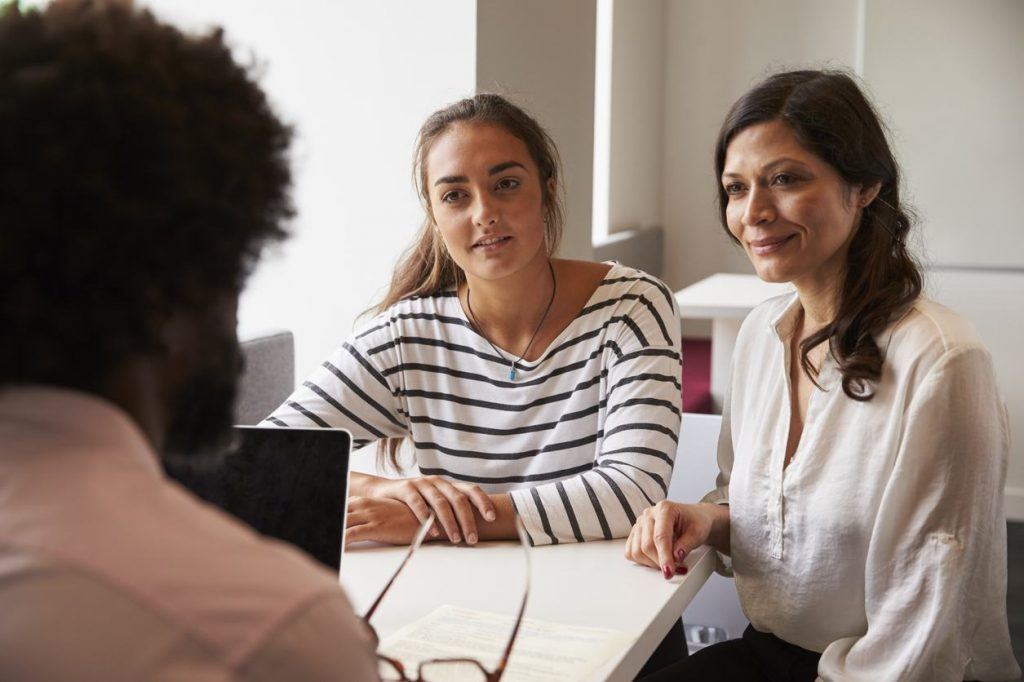
Mother And Daughter Meeting With Male Teacher
Communication is Key: Parent-Teacher Communication (Part 4)
Mark Griffin, M.E., Blog WriterIf you have children, you likely have gotten that dreaded call from your child’s teacher. Unfortunately, it’s almost always negative. I am a public school teacher of 87 middle schoolers but I also have two daughters. Therefore, I’ve been on both ends of the call. I have experienced exasperation as both a teacher and a parent. However, I’ve also experienced the unstoppable synergy that occurs when teachers and parents work together to help a student reach their academic potential.
So go to your child’s open house. Meet the teacher, shake hands and show a great deal of interest and enthusiasm in what’s going on in the classroom. Ask lots of questions, make sure you sign up for class newsletters and websites. It’s easier for a teacher to check email than return phone calls, so make sure you have the teacher’s email address and that the teacher has yours. I love all the emails I get from my parents on a weekly basis. I always thank them for their support and listen to their concerns.
About three years ago, I received an old-fashioned letter from a parent. The letter was mailed from one of my student’s home with an actual USPS stamp! In my 15 years of teaching, I’d never received a “snail mail” letter from a parent, so I opened it with great interest. It stated that due to a work conflict she was unable to attend the open house. However, she expressed a great deal of interest in how her daughter could be successful in class. She gave me all her contact information and detailed her daughter’s academic strengths and weaknesses. She expressed a positive attitude toward homework and maintaining a regular line of communication. I’ve decided to copy her idea, and mail my daughter’s teachers because I know that teachers get thousands of emails so handwritten letters stand out.
Research shows that the more a parent communicates with a teacher, the better the student does in class. Lots of parents volunteer at their child’s school. When a parent volunteers, it demonstrates to both the student and teachers how dedicated that parent is to education. Parent volunteers also have easy access to teachers and other school staff.
When a teacher contacts you about a problem involving your child, the single most important thing to remember is to resist the temptation to become defensive. It’s a parent’s natural inclination to protect and defend their child. However, in this instance, the teacher is not attacking your child, he or she is reaching out to you for help. Teachers can also get very defensive when they feel that a parent is criticising them. Becoming overly defensive can distract us from our main goal of helping the student reach their academic potential. It is imperative that the teacher and parent work together to maximize the student’s success in and out of the classroom.
If your child comes home saying that their teacher is being unfair, just remember there are three sides to every story. There is the student’s side, the teacher’s side, and somewhere in the middle is the real truth. It’s been my experience that, typically, the truth is a lot closer to the teacher’s side. Keep in mind that a young student’s brain is still developing, so their perception of reality is less developed than an adult’s. Also, most students are under a great deal of social pressure to band together and sometimes lie to protect their social status among their peers. On several occasions, I’ve had parents tell me that since they have taken their child to church, that their child does not lie. Even when faced with overwhelming, often physical evidence that their child is being less than truthful, many parents refuse to consider the idea that their child may not be telling the whole truth.
As the school year draws to a close, think about how you can foster better communication with your child over the summer in order to lay a foundation for a better school year in the Fall!
Communication is Key
Part 1 | Part 2 | Part 3 | Part 4
by Mark Griffin, guest blogger
 North Carolina Divorce Lawyers Blog
North Carolina Divorce Lawyers Blog

